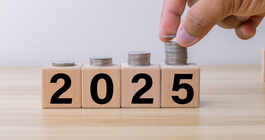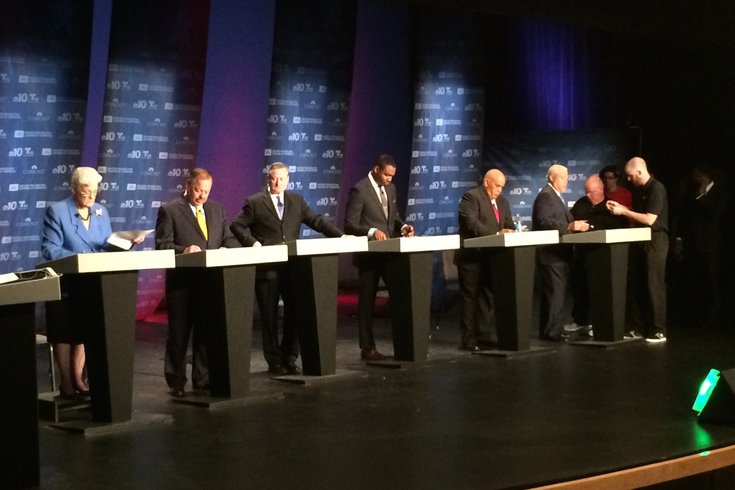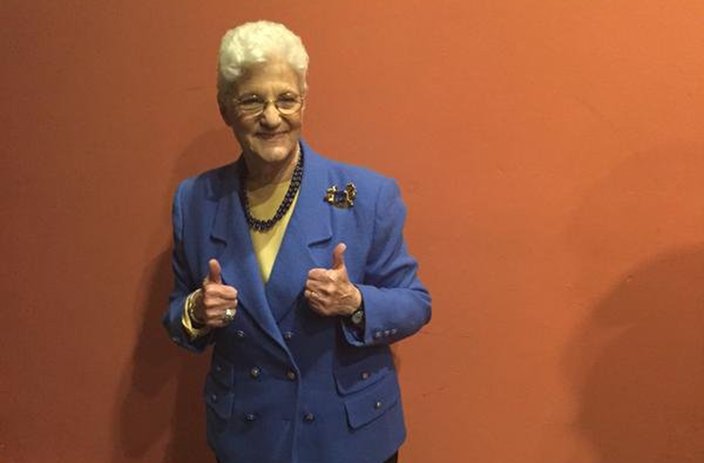The six Democratic mayoral candidates debated their positions on live television for the first time Tuesday, a prime opportunity to separate themselves from the pack.
But one of the leading contenders missed out.
Lynne Abraham, 73, fainted as Anthony Hardy Williams was completing the candidates’ responses to the first question of the debate, which focused on economic growth and job creation. She was helped off stage as NBC10 cut to an intermission.
Abraham, who recovered and spoke with reporters afterward, said she wanted to continue debating. But a doctor insisted she rest up and the debate continued without her.
Lynne Abraham prepares to speak with reporters after fainting during a televised mayoral debate. (Source: Lynne Abraham via Twitter)
"It just happened at an inopportune time, I regret to say," said Abraham, who insisted she is healthy enough to continue a busy campaign schedule. "It's a little bit embarrassing, but I fell gracefully. I didn't hurt anything."
Before fainting, Abraham called Nutter's real estate tax proposal a regressive tax, saying she preferred Gov. Tom Wolf's proposal to lower property tax rates. She said she would convene a stakeholders meeting to develop a "rational and fair tax policy so we can have a reoccurring and always available tax base to pay for our schools."
The other five candidates also opposed Nutter's proposal, which would hike real estate taxes by 9.3 percent.
Alongside Abraham, state Sen. Anthony Hardy Williams and former City Councilman Jim Kenney are considered as the candidates most likely to win the May 19 primary election.
Williams and Kenney sparred with one another regarding campaign advertisements funded by independent political action committees.
Both candidates have television ads funded by such groups, but Williams is the only candidate whose own campaign committee also has purchased ads. Thanks to the city's stringent campaign finance regulations, the six candidates' individual campaign coffers appear to be somewhat limited. (Updated figures are not available until closer to the election).
"I'm the only person on this stage who has actually paid for ads themselves," Williams said. "There is another candidate on this stage, Jim Kenney, who has ads up that are only paid by dark money."
Kenney shot back that he had no control over the Supreme Court decision that enabled such campaign spending. He also noted that the group funding one of Williams' ads is primarily funded by three wealthy financial executives.
"I don’t know who is funding my commercial, but I understand they are working people," Kenney said. "They are not billionaires."
Another animated response came when Rosenfield asked Milton Street, a former state senator, why Philadelphians should trust a man who was convicted of tax evasion.
Street pointed to his plan to cease violence in Philadelphia by creating entry-level positions to patrol community streets. He also voiced frustration that he continually faces questions over his prison tenure.
"You have five people up here who didn’t go to federal prison," Street said. "But they don’t have a plan to save your child."
Though the debate marked the first time the candidates appeared together for a televised event, they have participated in several community forums hosted by various organizations.
Tuesday's debate, held at the Kimmel Center in Center City, was sponsored by The Greater Philadelphia Chamber of Commerce, NBC10 and Telemundo 62. The debate served as major cog in the chamber's Roadmap for Growth initiative, which emphasizes economic growth, job creation and the 2015 mayoral election.
The candidates spent a significant portion of the debate discussing the potential for the natural gas industry to reshape Philadelphia's energy landscape.
Nelson Diaz, a former judge, said he favored Philadelphia's development as an energy hub, but cautioned against creating more pollution.
"We can’t continue to have more emissions and more pollution," Diaz said. "The fact of the matter is this is the dirtiest city in Pennsylvania and one of the dirtiest cities in America."
Doug Oliver, a former Nutter spokesman, said increased energy opportunities could bring low-skilled, manufacturing jobs back to the city.
"We, as a city, can do a much better job of attracting manufacturing jobs to the city," Oliver said. "We actually can use energy to attract those jobs back here. State lawmakers want to see Philadelphia do better, but they want to see us manage ourselves."
Street dismissed the idea of transforming Philly into an energy hub as unpractical, saying the city needs jobs immediately.
"You’re not going to do that in eight years," Street said. "Ask me a question that I can answer and I’ll have it done in eight years."
The candidates also addressed Philadelphia's 26 percent poverty rate, which doubles the national figure.
Kenney listed several ways to mitigate the issue, including improving Philadelphia's re-entry program for former convicts.
"We have to have a robust re-entry program for people coming back," Kenney said. "We don’t want them going back. We have to be prepared for them. Right now, we’re not prepared for them and their needs."
Williams said the best way to alleviate poverty is to improve the education system.
"The ability to move from poverty is proven in America," Williams said. "It’s through public education."

 John Kopp/for PhillyVoice
John Kopp/for PhillyVoice
